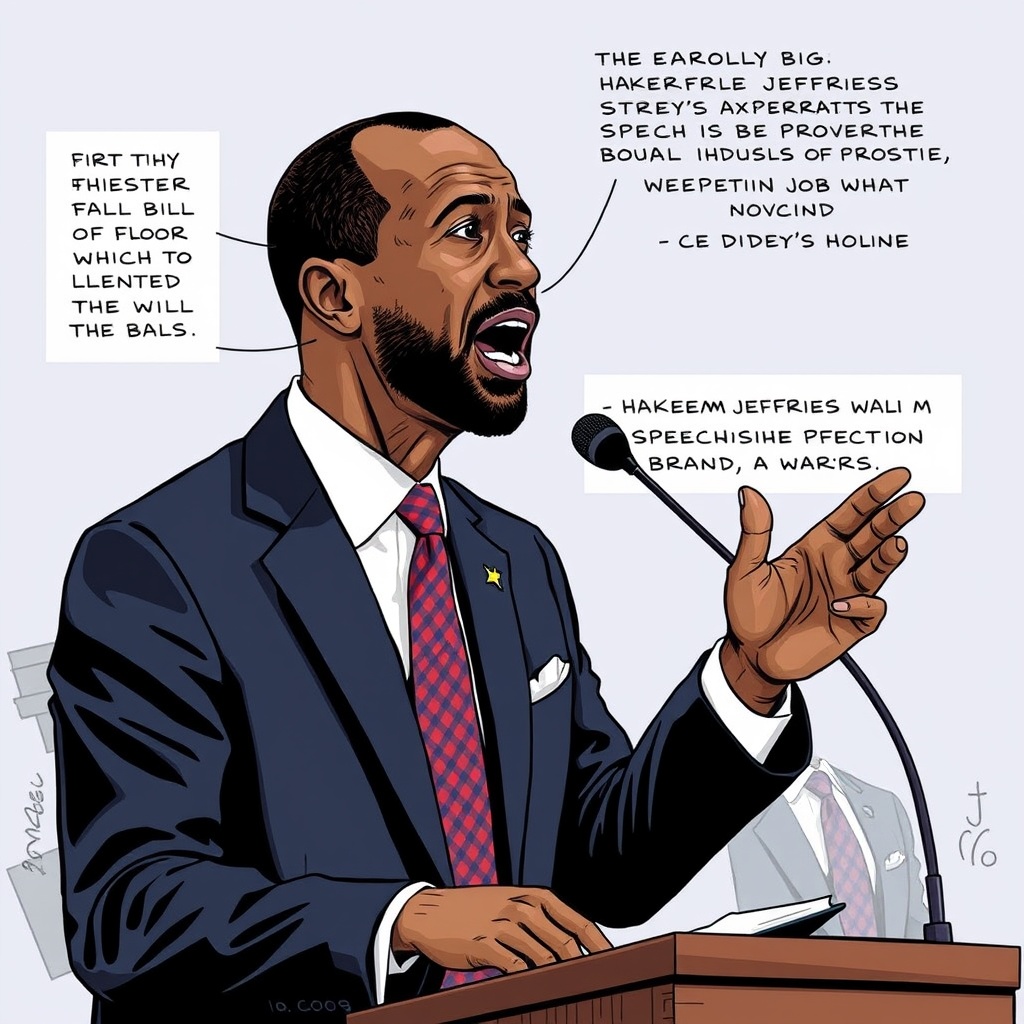Introduction
In a dramatic display of parliamentary procedure, Hakeem Jeffries, the Democratic leader, took to the floor of the House of Representatives to delay the passage of former President Donald Trump's tax bill. While the House does not have a traditional filibuster like the Senate, Jeffries essentially conducted one anyway, holding the floor for an extended period to slow down the legislative process. This article will explore the context behind Jeffries' actions, the tactics he employed, and the implications of his record-breaking speech.
Background on the Tax Bill
The tax bill in question was a key component of Trump's economic agenda, aiming to overhaul the US tax code and provide significant cuts to corporate and individual tax rates. The bill was highly contentious, with Democrats arguing that it would disproportionately benefit the wealthy and large corporations, while Republicans claimed it would stimulate economic growth and create jobs. As the bill made its way through Congress, Democrats sought to delay its passage, hoping to either amend it or prevent it from becoming law.
Jeffries' Record-Breaking Speech
On the day of the vote, Jeffries took to the floor, beginning a speech that would last for several hours. While the House does not have a traditional filibuster, which allows senators to hold the floor indefinitely, Jeffries used a combination of parliamentary procedures to extend his remarks. He spoke at length about the bill's provisions, citing statistics and expert opinions to argue that it would harm middle-class Americans and exacerbate income inequality. Jeffries also used the opportunity to highlight the bill's potential consequences, from increasing the national debt to reducing funding for essential social programs.
According to reports, Jeffries' speech lasted for over 8 hours, making it one of the longest speeches in House history. During this time, he yielded to other Democratic lawmakers, allowing them to ask questions and make brief comments, further prolonging the debate. This tactic, known as "yielding for questions," enabled Jeffries to maintain control of the floor while also giving his colleagues a chance to participate in the discussion.
Parliamentary Procedures and Tactics
Jeffries' ability to hold the floor for an extended period was made possible by the House's rules and procedures. In the absence of a traditional filibuster, Democrats have developed alternative strategies to delay or block legislation. These tactics include:
- Yielding for questions: As mentioned earlier, this involves yielding to other lawmakers to ask questions or make brief comments, allowing the speaker to maintain control of the floor while also giving others a chance to participate.
- Offering amendments: Democrats can offer amendments to the bill, which must be debated and voted on, further slowing down the legislative process.
- Requesting roll call votes: By requesting roll call votes on various provisions or amendments, Democrats can force the House to record individual members' votes, taking up more time and delaying the final vote.
These tactics, while not as dramatic as a traditional filibuster, can still be effective in slowing down the legislative process and giving Democrats a platform to express their opposition to a bill.
Impact and Implications
Jeffries' record-breaking speech and the accompanying parliamentary tactics had several implications. Firstly, it allowed Democrats to highlight their opposition to the tax bill and raise awareness about its potential consequences. By delaying the vote, Democrats were able to draw attention to the bill's provisions and build public pressure to amend or block it.
Secondly, the speech and subsequent debate gave Democrats a chance to build a sense of unity and solidarity among their ranks. By working together to delay the bill, Democrats were able to demonstrate their commitment to their values and principles, even in the face of overwhelming Republican opposition.
Finally, the tactics employed by Jeffries and his colleagues may have inspired future generations of lawmakers to use similar strategies to delay or block legislation. While the House's rules and procedures can be complex and nuanced, Democrats have shown that with creativity and determination, they can still find ways to slow down the legislative process and advocate for their constituents' interests.
Case Studies and Statistics
The use of parliamentary procedures to delay legislation is not unique to the tax bill or Hakeem Jeffries. Throughout history, lawmakers have employed various tactics to slow down or block legislation. For example:
- In 2013, Senator Ted Cruz (R-TX) delivered a 21-hour speech on the Senate floor, opposing the Affordable Care Act (ACA) and attempting to defund it.
- In 2018, Senator Tammy Duckworth (D-IL) used her privilege as a senator to delay a vote on a judicial nominee, arguing that the nominee was unqualified and would harm her constituents' interests.
According to a study by the Congressional Research Service, the use of parliamentary procedures to delay legislation has increased in recent years, particularly among minority parties. The study found that between 2011 and 2020, the number of filibusters and cloture votes in the Senate increased by over 50%, while the number of amendments offered in the House rose by over 20%.
Conclusion
Hakeem Jeffries' record-breaking speech and the accompanying parliamentary tactics demonstrate the creative ways in which lawmakers can use procedure to delay or block legislation. While the House does not have a traditional filibuster, Democrats have developed alternative strategies to slow down the legislative process and advocate for their constituents' interests. As the US Congress continues to evolve and become increasingly polarized, the use of parliamentary procedures to delay legislation is likely to become more common. By understanding these tactics and their implications, citizens can better appreciate the complexities of the legislative process and the ways in which lawmakers can shape the course of policy debates. Ultimately, Jeffries' speech and the subsequent debate serve as a reminder of the importance of parliamentary procedure and the enduring power of democratic participation in shaping the laws of the land.


Leave a comment